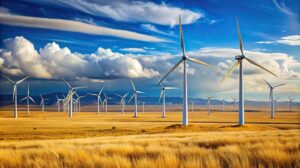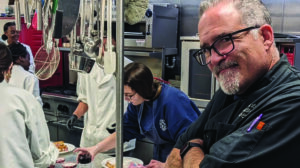However, there is good news.
By Deb Risden
In November 2023, the Colorado Public Interest Research Group released its seventh annual report on the state of recycling and composting in Colorado. CoPIRG is a nonprofit, state-based advocacy group that promotes public interest. The report states that Colorado continues to have a low recycling and composting rate of 16%, half the national average.
The 3 Rs — reduce, reuse and recycle — have long been recognized as the three tiers of a more sustainable lifestyle with an end goal of benefiting the environment.
Beginning with the post-World War II industrial revolution, many countries, including the U.S., engaged in a linear economic model — one that is often referred to as the take-make-waste economy. In a nutshell, resources are used to make products that end up being thrown away and become waste.
Beginning with the post-World War II industrial revolution, many countries, including the U.S., engaged in a linear economic model — one that is often referred to as the take-make-waste economy. In a nutshell, resources are used to make products that end up being thrown away and become waste. Historians point out there were also benefits of the industrial revolution such as mass production of goods and an increase in world population and wealth.
Its benefits notwithstanding, according to the Ellen MacArthur Foundation, over time, the linear economic system has resulted in negative effects. The linear economy “is a polluting system that degrades natural systems and is the driver of global challenges, including climate change and biodiversity loss.”
The concept of a circular economy has been around for decades and is a system whereby materials and products stay in circulation, never becoming waste. There are three prongs of a circular economy — clean production using less resource extraction, reuse and repair followed by resource recovery.
The 2013 World Economic Forum Report defines a circular economy as “an industrial system that is restorative or regenerative by intention and design. It replaces the end-of-life concept with restoration, shifts toward the use of renewable energy, eliminates the use of toxic chemicals, which impair reuse and return to the biosphere, and aims for the elimination of waste through the superior design of materials, products, systems and business models.”
Although some might say changing to a circular economy could hurt capitalism and free enterprise, others say it can help companies generate more value from resources. In a July 18, 2022, article in a Graduate School of Stanford Business publication, author Seb Murray stated, “The transition to a circular economy need not come at an economic cost; it can help companies generate more value from the resources they consume. With fewer mines, landfills, incinerators and more trees, the circular economy reduces waste and environmental harm. But there are several business benefits, too — lower operating costs, reduced supply chain risks, additional revenue streams, and access to new markets.”
CoPIRG’s report of below national average recycling and composting activity in Colorado is not all bad news.
The report states that recycling and composting practices are working well in some parts of Colorado; however, in other areas, there is a lack of access to services. The report states, “In Colorado, recycling, reuse and remanufacturing industries already provide nearly 86,000 jobs and generate $8.7 billion in economic benefits each year, despite our low statewide recycling rate.”
Colorado state legislatures are opening the doors to recycling to everyone. House Bill 22-1355, the Producer Responsibility Program for Statewide Recycling Act, was signed into law on June 3, 2022. Colorado is the third state in the country to adopt such a law. CoPIRG states the law will
- “Require producers of paper and packaging (cans, jars, boxes, etc.) who sell these products in Colorado to take responsibility for the end-of-life of these materials by ensuring recycling services for all Coloradans.
- Establish a Producer Responsibility Organization, joined by all of the producers, that will coordinate, fund, and manage this new statewide recycling system, overseen by the Colorado Department of Public Health and Environment.
- Provide access to recycling services at no cost to ALL Colorado residents, including those with historically limited access such as people living in apartments and rural areas.
- Fund 100% of the program, including the collection, processing, and transportation of recyclable materials.
- Provide Coloradans with a clear list of materials that can be recycled statewide.
- Save local governments money by reimbursing them for their costs to run recycling programs.”
The Producer Responsibility Organization has completed a statewide needs assessment with plans to submit an implementation plan to the advisory board and The Colorado Department of Public Health and Environment in early 2025. Public comment will be solicited prior to approval. Anticipated implementation of the plan will begin in 2026.
Composting is not without its challenges. The CoPIRG report states, “The goal of composting is to keep organic materials like food scraps and yard trimmings out of the landfill, which prevents the generation of harmful methane emissions, and instead to create a valuable soil amendment that will help Colorado farms and landscapes build healthy soils that absorb carbon dioxide from the atmosphere, reduce water and chemical use, and grow nutritious foods.”
Compost manufacturers have tightened requirements to avoid contaminants like glass and microplastics impacting the quality of compost. CDPHE has also been working with facilities and other stakeholders to update regulations that will help smaller and mid-sized compost infrastructure that will reduce costs for start-up businesses.
In October, The New Falcon Herald will report on reducing waste, the first step in the three R’s of sustainability and a circular economy.






